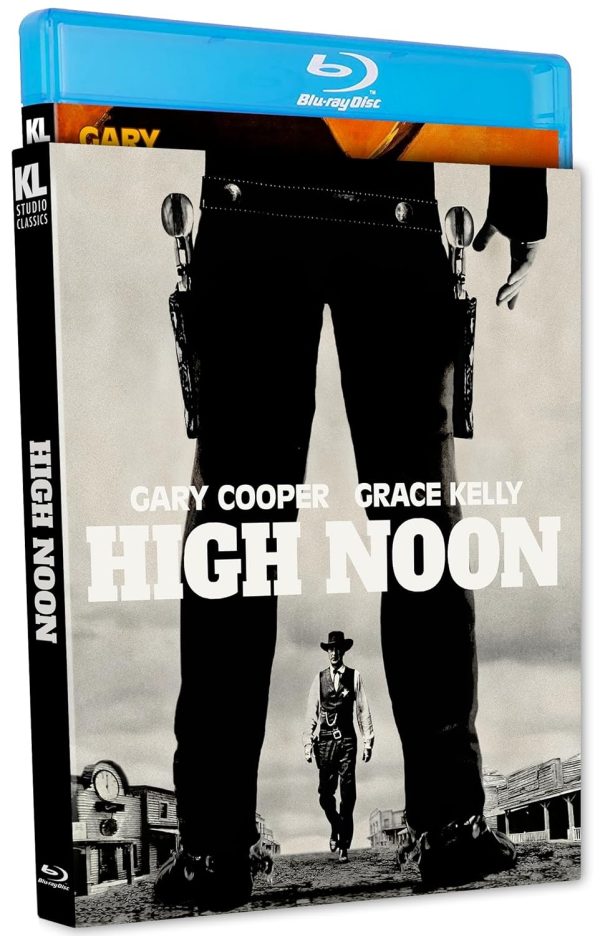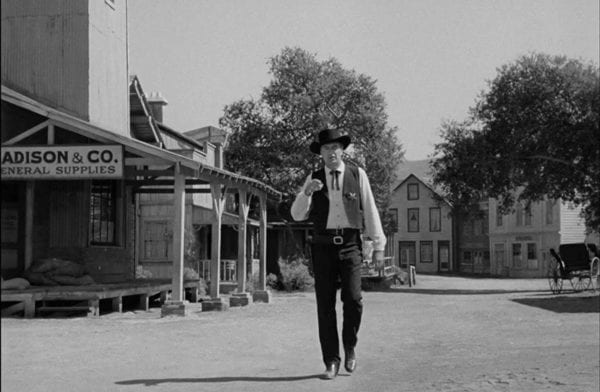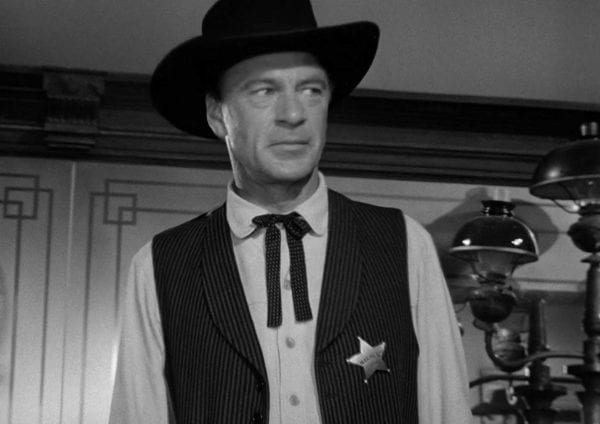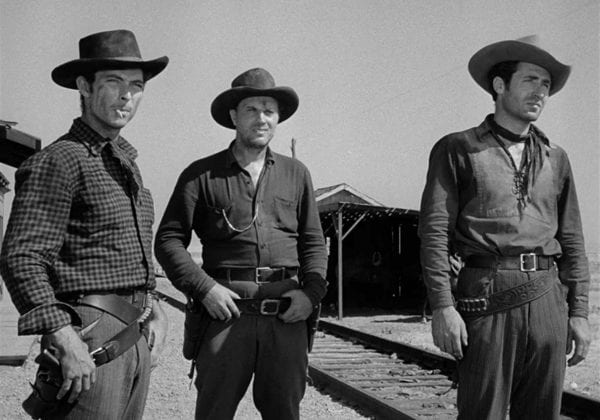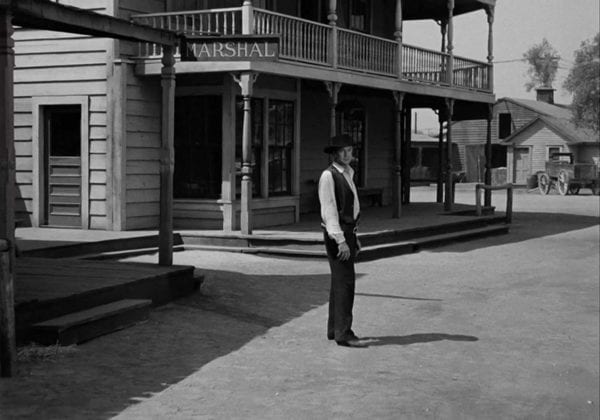High Noon, 1952.
Directed by Fred Zinnemann.
Starring Gary Cooper, Thomas Mitchell, Lloyd Bridges, Katy Jurado, Grace Kelly, Otto Kruger, Lon Chaney, and Henry Morgan.
SYNOPSIS:
Fred Zinneman’s seminal classic Western High Noon arrives on Blu-ray and 4K Ultra HD (a first for the latter format), courtesy of Kino Lorber. The company commissioned a new 4K scan of the original camera negative, along with a pair of new commentary tracks. Extras from previous home video editions have been ported over too. Highly recommended.
“It’s a civics lesson,” editor Mark Goldblatt (known for tons of movies, including The Terminator) says in the featurette A Ticking Clock on this new Blu-ray release of High Noon from Kino Lorber. (It’s available in a 4K Ultra HD edition too.) He notes that the movie is some other things too, of course, such as a near-real-time story and a classic Western, but that comment was the one that grabbed me.
Before I get into why, let me explain the film to you. High Noon is a taut, 85-minute Western in which Gary Cooper and Grace Kelly lead the cast as Will Kane and Amy Fowler Kane, respectively. The pair have just married, but Will learns that an old nemesis of his, Frank Miller, is due to return to their little town on the 12 o’clock train.
Will is the retiring town marshal, and he and Amy have plans to begin a new life together elsewhere, but he knows that Miller, who he arrested for murder only to learn the killer was released from prison, will hunt him down. Amy decides she will leave on that noon train rather than see her new husband dead at the hands of Miller and three other men who are waiting for their comrade at the station.
Will attempts to rally support by offering to deputize as many men as possible before the train arrives, but his efforts mostly fall flat. Even his current deputy marshal, Harvey Pell (Lloyd Bridges), won’t stand with him because he’s upset that he was passed over when a new marshal was chosen.
The rest of the supporting cast serves up a list of more great actors from that era, including Lee Van Cleef as one of Miller’s buddies, Lon Chaney, Jr. as the town’s former marshal, and Henry Morgan (probably best known for playing Colonel Potter on the TV series M*A*S*H) as one of the townspeople.
The civics lesson comes in the form of the many scenes in which Will tries to drum up supporters. While some men see it as their duty to defend the town against bad guys who threaten to set back its progress, others have a “I’ll stay in my lane, thanks” attitude. And some have more nuanced takes on the situation, understanding the need to do their civic duty while also not thinking this is the right time for that.
Given High Noon’s release just seven years after the end of World War II, it’s easy to see how the idea of civic duty was likely on moviegoers’ minds, considering how many of them lost loved ones during that horrible conflict. And what better way to consider that idea than in a tidy Western? After all, it’s a genre in which characters may have shifting allegiances, and there was certainly a strong sense of nascent civic responsibilities in frontier towns.
Whose responsibility is it to stand up to the bad guys when members of the law can’t or won’t do it, or are simply outnumbered four-to-one? Would you have joined Will in a mission that could easily be seen as foolhardy and downright suicidal? There are no easy answers to those questions, and, like many great movies, High Noon doesn’t tell us what to think about that.
This new edition of the film from Kino Lorber sports a fresh transfer from a 4K scan of the original camera negative. I’m sure it looks stunning on the 4K Ultra HD disc, but my Blu-ray copy still offered a very nice experience.
In addition, Kino Lorber commissioned a pair of new audio commentaries with film historians Alan K. Rode and Julie Kirgo. While having two film historians recording commentary tracks might seem like overkill, their chats are differentiated enough that both are worthwhile listens.
The rest of the extras were ported over from prior home video releases, starting with the A Ticking Clock featurette that I mentioned at the beginning of this review. It only runs about six minutes, but Goldblatt packs a lot of insight into his discussion, most of which revolves around the way the movie conveys its near-real-time story.
You’ll also find:
• A Stanley Kramer Production (14 minutes): Another film historian, Michael Schlesinger, brings up the idea of High Noon as a “message movie,” discussing how producer Stanley Kramer was interested in making such films during a time when Hollywood was very conservative about the subject matter it tackled. (Yes, you can certainly argue that Hollywood has always been that way and will continue to be so, as long as large corporations rule the industry.)
• Imitation of Life: The Blacklist History of High Noon (10 minutes): This movie came out at a time when McCarthyism was beginning to cast a long shadow across the United States, and screenwriter Carl Foreman was one of many blacklisted in Hollywood because of those disgraceful hearings. This featurette takes a look at that aspect of High Noon through the eyes of historian Larry Ceplair and another blacklisted scribe, Walter Bernstein.
• Oscars and Ulcers: The Production History of High Noon (12 minutes): Actor Anton Yelchin, who sadly died not long after participating in this featurette, narrates this look at the film’s production history via a variety of promotional and behind-the-scenes images.
• Uncitizened Kane: This is a text-only bonus feature that serves up an essay by Nick James, editor of Sigh & Sound magazine.
• The Making of High Noon (22 minutes): This is an extra that originally appeared on DVD and I believe skipped previous high-def editions of the film (this is my first time owning it on home video). Hosted by film critic Leonard Maltin, this is a breezy look at the making of the movie.
The trailer rounds out the platter.
Flickering Myth Rating – Film: ★ ★ ★ ★ / Movie: ★ ★ ★ ★
Brad Cook
